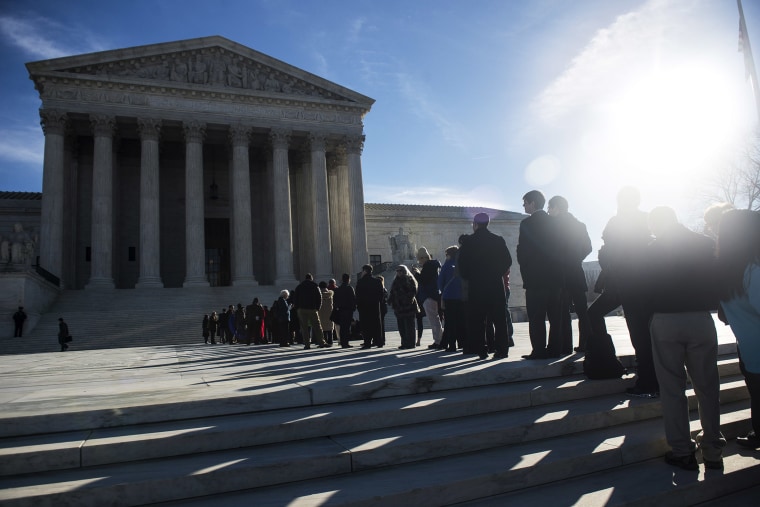In 2012, the U.S. Supreme Court ruled in a 5-4 decision that the Affordable Care Act is, in fact, constitutional. The ruling cleared the way for law to be fully implemented, and the results have been
pretty extraordinary. "Obamacare" has brought coverage to millions of families; it's strengthened health security for tens of millions; it's lowered health care costs; it's improved the nation's finances; and it has quite literally saved lives.
The Supreme Court has agreed to hear a new challenge to the Obamacare's health-care subsidies, and its ruling could potentially undermine an integral piece of the law. The court will hear arguments for a case challenging tax cuts for insurance purchased on exchanges that the federal government set up under Obamacare, according to SCOTUSBlog. The case, King vs. Burwell, along with a similar challenge known as Halbig vs. Burwell, contend that the Affordable Care Act only creates federal subsidies for insurance purchased on exchanges set up by states themselves. If a state chooses not to set up an exchange, the federal government can step in to do so -- but the plaintiffs argue federally established exchanges cannot benefit from the subsidies.
This may sound like an obscure technical problem, but the outcome of this case could, in theory, prove catastrophic to the American health care system.
The right's argument is, in effect, that every American who gained subsidized coverage through healthcare.gov shouldn't have been able to do so. Why not? Because, according to the law's critics, only those who enrolled through state exchange marketplaces are eligible for subsidies under their interpretation of the law.
According to the Affordable Care Act's architects, that's demonstrably insane -- why would they design their own system to fail on purpose? -- but the right has clung to some ambiguous phrasing in the statute to insist millions of Americans should be stripped of their subsidies.
And if consumers lose the subsidies, they can't afford the insurance. And if they can't afford the insurance, they withdraw from the system. And if they withdraw from the system, there may not be enough consumers to support the overall market. The "death spiral" kicks in and American health care unravels -- if five justices say so.
The 4th Circuit Court of Appeals, in a unanimous ruling,
rejected the case as ridiculous. Judge Roger Gregory wrote that the plaintiffs could not "rely on our help to deny to millions of Americans desperately-needed health insurance through a tortured, nonsensical construction of a federal statute whose manifest purpose, as revealed by the wholeness and coherence of its text and structure, could not be more clear."
This is the case the Supreme Court today agreed to hear on appeal.
Note, two federal district courts also rejected the matter as ridiculous, though far-right judges on the D.C. Circuit said they have no choice but interpret a possible drafting error in the most foolish way possible.
And now we'll wait to see if the Supreme Court is prepared to do the same.
Do the high court's conservatives see themselves as judges or partisan activists? Do they believe cherry-picking an ambiguous phrase in a massive statute is reason enough to destroy the American health care system?
If contemporary politics weren't quite so twisted, these questions would be easier to answer. For now, however, I'm reminded of
Brian Beutler's analysis from July, which still rings true: the case "was and remains a fundamentally dishonest solicitation of right-wing judicial activism."
A majority on the three-judge panel [on the D.C. Circuit] essentially held that phrases read out of context in a section of the ACA statute "unambiguously" prohibit the IRS from subsidizing insurance plans in states that didn't set up their own exchanges. That's what the originators of the suit wanted them to do. But it required those judges to ignore no less a conservative than Supreme Court Justice Antonin Scalia, who last month described the "fundamental canon of statutory construction that the words of a statute must be read in their context and with a view to their place in the overall statutory scheme." From that view, I'd argue that the statute is unambiguous…. What the challengers have asked judges to do is to ignore the "fundamental canon" and buy into the idea that the Democrats who passed the law unambiguously structured it to withhold premium subsidies from states that refused to set up their own exchanges, as some sort of high-stakes inducement. This is plainly false. It's the giant whopper underlying the entire theory of Halbig. A completely fabricated history of the Affordable Care Act, which treats the scores of reporters who covered the drafting of the law as idiots, and the aides and members who actually drafted it as bigger idiots and liars as well.
I've been following politics, public affairs, and public policy for many years. I have never seen anything quite so spectacularly stupid as this case. That's not an assessment I make lightly, but I believe it strongly.
